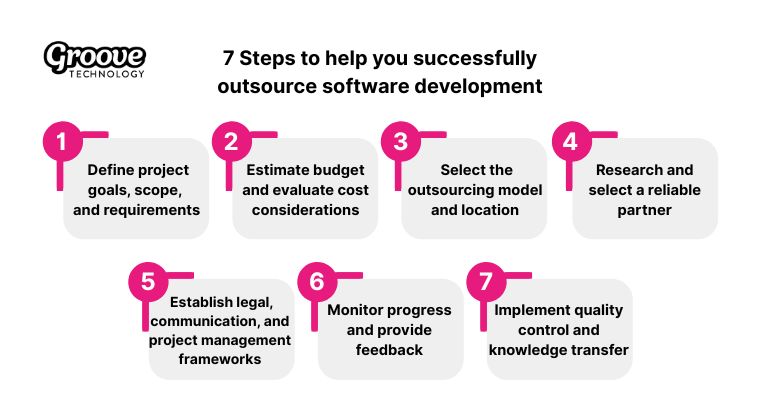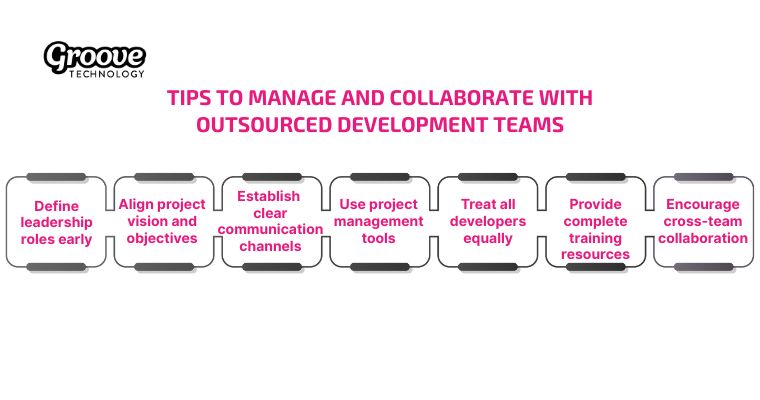How To Outsource Software Development Projects Effectively In 2026?
Software development outsourcing refers to hiring an external company or third-party specialist to handle software-related tasks such as building, maintaining, or upgrading applications. This practice enables businesses to access experienced professionals, reduce costs, and expedite delivery timelines without managing a full in-house team.
Talent shortages and rising operational costs continue to drive the expansion of outsourcing in software development because companies need to stay competitive in a demanding market. IDC projections show that over 90% of enterprises anticipate skills gaps costing up to $5.5 trillion globally by 2026 so you might find it difficult to hire locally. Arnia data reveals that 63% of companies are outsourcing to reduce internal complexity which highlights that efficiency is a key driver alongside savings.
Location differences also play a significant role, as Eastern European developers charge between $25 and $50 per hour, compared with up to $150 per hour for onshore teams. While outsourcing offers substantial savings, time zone gaps and cultural mismatches may affect collaboration if not managed carefully.
This article will explain:
- What does software development outsourcing mean
- Why global companies prefer outsourcing developer teams
- The types and models of outsourced development
- Seven steps for successful outsourcing
- Who should outsource and what risks to avoid
- How to manage collaboration effectively
Anyone seeking clarity on managing outsourced software development will gain practical knowledge from this guide that connects every stage of the outsourcing process.

1. 7 Steps to help you successfully outsource software development
If you’re wondering how to outsource software development effectively, following these 7 essential steps will help ensure your outsourcing journey is successful. Understanding each stage of the outsourcing software development process will allow you to manage expectations, improve collaboration, and deliver results efficiently.

Step 1: Define project goals, scope, and requirements
Project definition predicts outsourcing success because vague requests inevitably lead to budget overruns or scope creep. You must translate your vision into a technical blueprint before you contact vendors to ensure clarity. Your goals must bridge the gap between business outcomes and engineering needs so you should specify what success looks like for every stakeholder. For example, business goals focus on market speed or cost efficiency while technical goals prioritize system performance and security compliance.
The scope of work defines the boundaries of the project because it clarifies exactly what the vendor will deliver and what remains excluded from the agreement. Your internal team needs to answer critical questions about strategic alignment and technical specifics before you engage any partner. You should package these answers into a Product Requirements Document since vendors can provide accurate quotes much faster when they work from clear documentation.
Step 2: Estimate budget and evaluate cost considerations
Budget estimation requires precise calculation of professional rates and team size to build a financially sound foundation. The hourly rate acts as just the sticker price so you must apply the Total Cost of Ownership framework to calculate the real cost of your software. Experienced CTOs typically add a 20% to 30% buffer on top of the vendor quote because this covers hidden operational realities like management overhead and infrastructure costs.
You should conduct a market rate analysis using the table below to ensure you do not overpay or fall for a quote that signals low quality.
| Country | Average Cost per Hour |
| United States | $100 – $149 |
| Canada | $100 – $149 |
| Australia | $100 – $149 |
| Poland | $50 – $99 |
| Philippines | $25 – $49 |
| Ukraine | $25 – $49 |
| Spain | $25 – $49 |
| Mexico | $25 – $49 |
| India | <$25 |
Source: Clutch.co
You should break your budget into line items to identify cost sinks early instead of relying on a lump sum. Below is an example evaluation for a standard 4-month MVP project (approximately 693 hours per full-time employee):
- Core Development (3 Engineers x $37/hr) = 3 engineers × 693 hours × $37/hr = $76,923
- Project Management (0.5 FTE x $37/hr) = 0.5 FTE × 693 hours × $37/hr = $12,821
- QA & Testing (0.5 FTE x $37/hr) = 0.5 FTE × 693 hours × $37/hr = $12,821
- Estimated cloud hosting, tools, licenses = $5,000
- Buffer (15% for unforeseen changes) = $107,565 × 15% = $16,135
TOTAL ESTIMATED COST: $123,700

Step 3: Select the outsourcing model and location
Choosing the right software development outsourcing models and location is a critical step that shapes the structure, efficiency, and long-term success of your software development project. To make an informed decision, businesses should carefully consider both how they want to collaborate and where their partners should be located.
There are three primary outsourcing models, each offering a different balance of control, responsibility, and flexibility:
- Staff augmentation: This model allows companies to extend their in-house development capacity by bringing in external developers who work as part of the internal team. It’s ideal when you need specialized expertise or temporary scaling, while still maintaining full control over project direction and workflows.
- Dedicated or managed team: In this setup, an external team works exclusively on your projects under a collaborative partnership. You benefit from a focused, cross-functional team that shares responsibility for delivery, while you stay involved in strategy and priority setting. It’s a strong fit for long-term initiatives requiring tight integration and shared ownership.
- Project-based outsourcing: Here, the outsourcing partner takes full responsibility for project execution, from planning to delivery. The client’s role becomes more strategic, focusing on high-level goals, vision, and approvals, while the partner manages the day-to-day execution. This is suitable for companies with limited technical resources or for self-contained projects with clear scopes.
Once the model is defined, the next step is selecting a geographic location for your outsourcing partner. This decision affects everything from cost and time zone alignment to legal protections and cultural compatibility.
- Onshore outsourcing offers seamless communication, shared legal frameworks, and strong IP protection. However, it tends to be more expensive.
- Nearshore outsourcing (e.g., to countries in Latin America or Canada for U.S. companies) balances cost savings with convenient time zone overlap and similar business culture.
- Offshore outsourcing (e.g., Eastern Europe, Vietnam, India) provides the most cost-effective options, with many countries offering highly skilled talent at significantly lower rates.
According to a Deloitte report, 59% of businesses outsource to reduce costs, while 57% do so to focus on core business functions. That’s why finding the right model and location is not just about saving money, it’s about aligning your outsourcing strategy with your company’s overall growth goals.
>>> See more: Types of Software Development Outsourcing Models: Find the Best Model for Your Project
Step 4: Research and select a reliable partner
When it comes to outsourcing software development, the first and arguably most important step is choosing the right country to outsource to. Each region offers distinct advantages and limitations that can directly impact collaboration efficiency and product quality.
Today, Eastern Europe and Latin America are emerging as strong outsourcing hubs due to their competitive rates and skilled engineering talent. Increasingly, Vietnam is also emerging as a competitive outsourcing destination. The country offers a highly skilled, youthful workforce with strong English capabilities, and software development costs that are often 50–70% lower than in many Western countries. For startups and SMEs looking to balance quality and cost, choosing the best software outsourcing company in Vietnam is an attractive option worth considering.
It’s also wise to collaborate with global hiring platforms or trusted recruiting partners. These organizations often have direct connections with top universities and reputable software vendors in specific regions. They can quickly refer you to vetted, high-quality partners, saving you both time and risk.
Once you’ve identified promising regions and potential vendors, evaluate them across several key factors:
- Portfolio and case studies – What have they built? For whom? How successful were the outcomes?
- Company size and business longevity – Older, more established teams typically have more stable operations and defined processes.
- Industry-specific experience – Vendors with relevant domain knowledge can ramp up quickly and deliver better results.
- Time zone compatibility – Crucial for smooth, real-time collaboration.
- Transparent pricing structure – Watch for hidden fees or vague billing models.
To validate this information, use software review websites like Clutch or GoodFirms, consult industry peers, or request direct references from past clients. With the right groundwork, you’ll be well-positioned to move forward confidently with a reliable and cost-effective partner.

>>> See more: How To Choose a Software Outsourcing Company? A Best Guide
Step 5: Establish legal, communication, and project management frameworks
Your outsourcing project won’t succeed without a robust framework for legal protection even if you selected the right partner. You must sign contracts that clearly outline intellectual property ownership and delivery timelines to prevent future disputes. You should explicitly include a “Termination for Convenience” clause and a “Code Escrow” agreement because these protections ensure that you still own the code hosted in a neutral repository if the vendor goes bankrupt or fails to deliver. Also, you need to ensure your partner aligns with global data regulations like GDPR or HIPAA if you are outsourcing internationally.
For communication, your team can implement a regular workflow using tools like Slack or Zoom so you can establish a shared language for all deliverables. You can assign a dedicated Product Owner or a primary point of contact because this role minimizes miscommunications and improves turnaround times. When it comes to project management, use tools such as Jira, Trello, ClickUp, or Asana to track milestones, manage tasks, and ensure complete transparency throughout the development lifecycle.
Step 6: Monitor progress and provide feedback
Outsourcing doesn’t mean handing off the work and walking away. On the contrary, staying actively involved is crucial to ensure both progress and quality. You should set a clear work schedule, hold regular check-in meetings, and use project management tools like Trello, Jira, or Asana to keep everything on track.
Equally important is giving timely and constructive feedback. Help your partner understand expectations clearly by pointing out specific issues and offering actionable suggestions. Avoid vague comments—instead, provide detailed input that helps improve the product.
Also, don’t forget that feedback is a two-way street. Be open to insights from your development partner, they may identify risks you haven’t considered or suggest more efficient solutions. When both sides align around a shared goal, productivity and outcomes improve significantly.
Step 7: Implement quality control and knowledge transfer
An outsourced project should not be considered complete the moment the code is delivered. Long-term success depends on continuous quality control and smooth knowledge transfer to your internal team.
Your team should start by implementing a robust QA process that includes unit tests, integration tests, and user acceptance testing. Modern development automates quality so you must demand access to the CI/CD pipeline to monitor progress. This access allows you to see the build health daily instead of waiting for the vendor to send a report.
Next, you must ensure that all technical documentation, architecture diagrams, credentials, source code, and user guides are fully handed over. This is crucial for future scalability, seamless onboarding of new team members, or transitioning to another vendor if needed.
Lastly, schedule retrospective sessions after key milestones. These reviews help identify what worked well and what needs improvement, fostering both higher performance and stronger long-term collaboration.

2. Tips to outsource and manage development teams effectively
Managing outsourced software development requires establishing clear processes, maintaining consistent communication, and building a foundation of mutual trust. The seven tips below help you streamline coordination, strengthen accountability, and create a more cohesive partnership between your internal team and your external developers.
- Define leadership roles early: You should clearly identify the key decision-maker from day one. When you assign a dedicated point of contact, you eliminate confusion for your outsourced team and prevent tasks from slipping through the cracks. As a result, you keep the workflow moving smoothly without unnecessary back-and-forth.
- Align on project vision and goals: You shouldn’t simply hand over a task list; instead, you should explain the purpose and intention behind the product. When you help your outsourced team understand the soul of the project, not just the code, you ensure that everyone works toward the exact same objective.
- Establish clear communication channels: From the start, you need to set a consistent communication rhythm. Whether you choose daily stand-ups or weekly sprint reviews, you should create a reliable space for real-time discussion. This helps you shorten feedback loops and catch misunderstandings before they become costly problems.
- Use project management tools: You should bring everyone onto the same platform. By using tools like Jira, Asana, or Trello, you create a single source of truth for tracking progress. This reduces the number of status meetings you need and allows developers to focus on writing high-quality code.
- Treat all developers equally: You must avoid creating an “us vs. them” dynamic. When you treat outsourced engineers as full members of the team, you encourage stronger ownership and more proactive engagement. This helps you foster a positive and productive working environment.
- Provide complete training resources: You shouldn’t force your outsourced developers to reverse-engineer your legacy systems. Instead, you should give them full access to documentation, onboarding materials, and technical resources from the beginning. This enables them to ramp up quickly and contribute effectively sooner.
- Encourage cross-team collaboration: Finally, you should encourage your internal team and outsourced developers to brainstorm and solve problems together. By promoting this collaboration, you not only create stronger technical solutions but also build natural trust, turning a transactional arrangement into a true partnership.

3. Conclusion
Outsourcing software development can be a game-changer for businesses seeking to innovate and scale efficiently. By understanding the advantages and outsourcing software development process, addressing potential challenges, and learning how to outsource software development effectively, you can harness the full potential of outsourcing. Remember to choose your outsourcing partner carefully, considering factors like expertise, cultural fit, and long-term compatibility.
Understanding how to outsource software development with the right strategy and partner can drive your business towards greater success and competitiveness in the digital age. Connect Groove Technology for more information!
Related Articles:
- What Software Staff Augmentation Means for Agile Product Teams
- Dedicated Software Development Teams: Key to Long-Term Project Success
- Hiring Outsourcing Software Developer Team: A Startup-Friendly Solution





